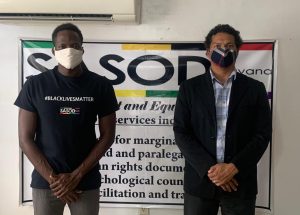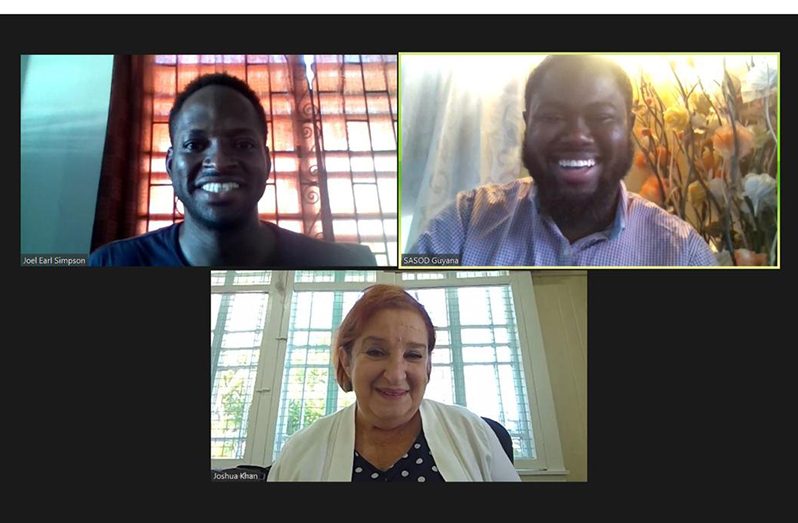-wants to include sexual orientation among others as grounds for discrimination
By Richard Bhainie
THE Society Against Sexual Orientation Discrimination (SASOD) is seeking to reform the Prevention of Discrimination Act 1997, which deals with discrimination in the workplace.
The organisation wants a reformation of Section Four of the Act (Prohibited grounds of discrimination) and has asked for it to include ‘Sexual Orientation’, ‘Gender Identity’ and ‘Gender Expression’ as grounds for discrimination.
During an interview with this publication on Friday, Joel Simpson, Managing Director of SASOD, explained that the organisation has initiated discussions with Parliamentarians for the revision of the Act, which is the priority of their legislative agenda for 2021.
The Prevention of Discrimination Act 1997 provides for the elimination of discrimination in employment, training, recruitment and membership of professional bodies and the promotion or equal remuneration to men and women in employment.
The Act prohibits discrimination in a place of employment based on: race, sex, religion, colour, ethnicity, indigenous population, nationality, social origin, economic status, political opinion, disability, family responsibilities, pregnancy, marital status or age.
Discrimination within the Act accounts for ‘sex’ as a ground for discrimination, however, it does not account for discrimination based on ‘gender’.
While the two terms are often used interchangeably, sex refers to the biological aspects of an individual as determined by their anatomy, generally male or female, assigned at birth based on the genitalia the individual is born with and the chromosomes they have.
Gender is a social construct relating to behaviours and attributes based on labels of masculinity and femininity; individuals have the discretion of choice as to what gender they choose to identify as.
SASOD has so far met with the Deputy Speaker of the National Assembly, Lenox Shuman, and the Minister of Parliamentary Affairs and Governance, Gail Teixeira.
“Both the Deputy Speaker and the Minister of Parliamentary Affairs and Governance, received us well; they said that it’s something very basic, its ordinary legislation and a simple amendment and they see no reason why we can’t have that tabled and passed in 2021,” Simpson said.
To foster a bipartisan approach, the organisation intends to engage the Minister of Human Services and Social Security, the Minister of Legal Affairs and Attorney General, other members of the government and the opposition.

“We don’t want this to be framed in any partisan political way, this is human rights legislation and we don’t want it to be at the mercy of partisan politics; that’s why we’re making great effort to take a bipartisan approach and engage all round,” Simpson explained.
He added: “Whosoever we meet with on the government side, we will try to meet with the opposition shadow for that portfolio.”
SASOD is hopeful for unanimous support from both sides of the House when the amendment is tabled and presented before the National Assembly. Simpson explained that in 2017, the organisation met with then Attorney General, Basil Williams, S.C. who requested that the organisation draft the proposed amendment for cabinet’s consideration.
Consequently, the organisation would have then consulted the United Nations Development Programme (UNDP) who facilitated two rounds of consultancy and supported them with a draft bill.
However, the bill was never introduced in the National Assembly due to the dissolution of Parliament in 2019.
“We were at that stage in December 2018, we had workshops planned with the Social Services Committee and Economic Services Committee of Parliament and they said let’s do the workshop in 2019, however, after the no-confidence motion, the rest was history,” Simpson explained.
Simpson explained that the amendment to the Prevention of Discrimination Act 1997 is imperative, and will be seen as a major milestone in bringing Guyana up to par with modern human rights legislation.
“We’re taking it one step at a time; and for us this is the low hanging fruit, once we achieve this for 2021, we’re going to move on to other issues,” Simpson explained.
With the amendment of the legislation, members of the LGBTQ+ community cannot be discriminated against, based on their gender identity, in the workplace.
This is part of SASOD’s Human Rights Programme, designed to protect LGBTQ+ Guyanese from discrimination in the enjoyment of their human rights.




.png)









